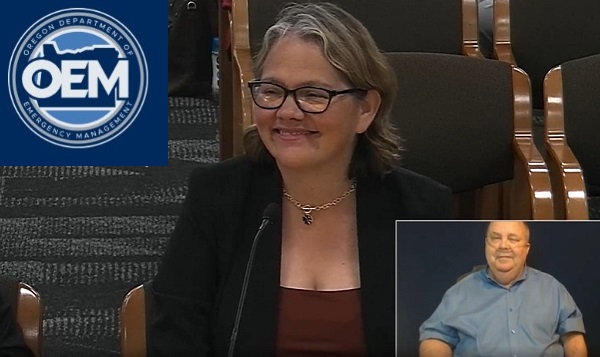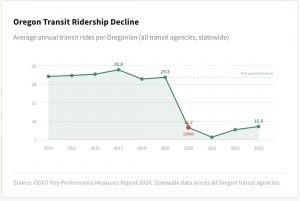Patence Winningham gets a warm welcome
8 min read
The former emergency manager for the city of Eugene and Lane County gets a warm welcome to her new job. Patence Winningham is deputy director of Oregon’s new Department of Emergency Management. At the Oregon legislature Sept. 28:
[00:00:16] Rep. Dacia Grayber: We are delighted to welcome the Oregon Department of Emergency Management for an update and a welcome to our brand-new director and deputy director, Erin McMahon and Patence Winningham…This is so exciting. Patence, you have spent more than a few hours, I think, testifying this committee, so welcome back with an agency.
[00:00:38] ODEM Deputy Director Patence Winningham: Thank you. Chair Grayber, Co-chair Tran, and Co-chair Lewis, and members of the committee:
My name is Patence Winningham. I do know a number of you and thank you very much for the opportunity. I was going to cover some of my background historically, living through disasters.
[00:00:53] I first started in emergency management in 2007 at the city of Eugene as the senior program coordinator for emergency management and I started with Olympic trials security planning. So, coordination with first responders and standing up a multi-agency coordination center with many partners.
[00:01:10] And that’s where I signed the deal with emergency management, that I was forever tied into how I was going to help first responders evolve into the future of emergency management and the ICS structure. Supporting those first responders, knowing that I would never be the person putting water on fire, or catching the bad guy, or answering the 911 call, how could I do the best work to support them?
[00:01:31] And that’s from an EOC—operation center of support and coordination. I spent about 14 years being responsible for the Emergency Operations Center at the city of Eugene and preparing them in emergency operations planning, but also in COOP (continuity of operations) planning. And it really was within that organization in that major metropolitan area.
[00:01:50] In 2019, I moved to Lane County to become their emergency manager, and I spent the last four and a half, almost five years with Lane County. And trial by snow on day four. So, Snowmageddon was my fourth day on the job at Lane County, and there was a significant learning curve—new faces, new names, and my jurisdiction got much larger.
[00:02:11] Lane County runs from sea to summit. The population is about 385,000 now with very rural and major urban population. So, the hazards got, the number got larger: Wildfire risk, flooding risk, access to information, support, and coordination for those first responders. Also the fire district number got bigger too. So from one fire district to 20+ fire districts was significant.
[00:02:37] In my first four months in Lane County, there were wildfires, floods, and snowstorm. And I would have to say that my job wasn’t easy, and everybody has pushed from behind. But I’d have to say that it was a team. It was not a single effort. There were a number of people within Lane County and within that whole community that helped us support the response and the recovery from many of those events.
[00:03:00] I have three federal disasters under my belt at Lane County from COVID to Holiday Farm Fire. Holiday Farm Fire afforded me the opportunity to look much larger at when our resources are drawn down, the emergency preparedness level, and we don’t have access to the things we need to meet the needs of our community in the first 24, 48, or 72 hours and how do we integrate with all of our partners. That is where I believe my focus is and where I hope that I can take that at my role at the state.
[00:03:32] I took this job to support the new director and the team at ODEM to do the best that they can to provide support and coordination to what you’ll learn are additional emergency support functions and their role in disasters. And so with that, I will yield the floor back to the chair. Thank you very much.
[00:03:50] Rep. Dacia Grayber: Thank you so much, Deputy Director. We are thrilled to have you here as well, obviously also having such a direct connection to local emergency management and time in that. We have the best of both worlds here, and I couldn’t be happier about that.
[00:04:04] Rep. Charlie Conrad: Patence, I can’t tell you enough how excited I am. I got a chance to work with Patence in a number of her EOCs, and Chair, you said it correctly, that her connection to the local government, how it works, and getting those resources together and understanding what that support needs—I’m excited to have you up here and excited to continue to work with you. So thank you.
[00:04:23] Rep. Thuy Tran: Thank you for being here. In my House district, there’s more than, around 10 neighborhoods, and some of them are really into the NET—Neighborhood Emergency Team. How are you reaching down to the citizen as you work on your plan in dealing with emergency? Like one in 10 talks about NET when I go to their neighborhood association. So how will you get collaboration from our citizens at that level?
[00:05:00] ODEM Advisor Matt Garrett: Chair Graber and Co-Vice Chair Tran: Again, this is an opportunity. The relationship we have with our local emergency managements, taking it down into the community, taking it down into the neighborhoods to say: This is how you prepare.
We have outreach pocket guides that articulate as an individual, here’s the responsibility that you need to take to prepare yourself, to prepare your family in times of crisis.
[00:05:26] Because given the severity of the event, it may be weeks. When we have a two-week ready discipline, we can inform people. But educating, it’s foundational. Education. But it starts as we engage our local folks and then cascades down into the various communities and the neighborhoods to inform people on an individual basis:
[00:05:46] This is your responsibility. This is the local responsibility. Here’s the state responsibility and again, given the intensity of a disaster or a crisis, this is the federal responsibility. I think we need to inform up and down that scale.
[00:06:02] Rep. Charlie Conrad: Director Garrett, you basically answered my question. My experience with all the emergency management it’s communication, is communication up. And particularly it plays out at the local level with citizens that actually need help and need assistance, and do they know where to go? Do they know that assistance?
So a lot of what I see with the ESFs (Emergency Support Functions) and what has been talked about state agencies, I am curious because of a gap in my knowledge, what is the relationship between ODEM (Oregon Department of Emergency Management) and LOC (League of Oregon Cities) and AOC (Association of Oregon Counties) and SDAO (Special Districts Association of Oregon) to help them spread that word throughout their members? And again, to be part of that chain of communication so they can help and assist both in the smaller communities, where I’ve got Lowell: How is Lowell going to be assisted and how are they going to be communicated to? But also my populated unincorporated areas as well.
[00:06:45] ODEM Advisor Matt Garrett: Chair Graber, Rep. Conrad, this is an excellent question. And I think it was spoken to by Director McMahon and Deputy Director Winningham. Now, obviously, the Association of Oregon Counties, the League of Oregon Cities, they can amplify the message, but you have to have an agency who wants to be forward-leaning and engaging.
[00:07:04] I think we now stand at a pivot point in the organization where we’ll engage a little more assertively and aggressively, not only seeking the input of what our partners want of their Oregon Department of Emergency Management, but how, again, can we use the collective wisdom to inform and then use the networks they have to filter down, not only at the elected levels, but into the communities, into the business of the agency.
[00:07:32] So I think you’ll see over time a more robust relationship as a conduit between this agency and our local partners. We deal mostly with counties, for all intents and purposes. There are some bigger cities that we engage in here. But using the League of Oregon Cities to help amplify the message and the forward lean, getting back to the educational component that I think we have a responsibility of. I think that’s the relationship you’ll see grow over time.
[00:07:56] And then, to your point about intentionality of coordination. It is incumbent upon us. We need to make sure that we are focused and we’re maximizing the assets that all the ESF agencies can bring to the table to ensure that as we deploy and mobilize, we bring our best to the Oregonians who are fighting an issue, an impact, or a time of crisis.
[00:08:21] Rep. Dacia Grayber: And if I may follow up a little, one of the, I think, questions we have going forward, especially looking at some of the challenges that we’ve faced as a state that called on these different ESFs, is: How are we analyzing performance? And I know there’s after action reports, but is the final answer within the ownership of ODEM or is it with the individual agencies and how are we tracking that?
[00:08:45] ODEM Advisor Matt Garrett: Madam Chair. I think it’s the responsibility of this agency, whether it’s a hot wash or it’s a full-blown after-action review, I think to capture that and as part of a jump-off point with a conversation with this agency, bring it forward.
[00:08:58] Audits can be seen as a poke in the eye by some. I see them as a business tool, to be very honest with you, because it identifies opportunity to grow and advance the practice here. And I think this agency, under the leadership of Director McMahon and Deputy Director Winningham, I think they will embrace that.
[00:09:16] It will inform their deliberations and eventually the discussions and direction of the agency.
[00:09:24] Rep. Paul Evans: I just want to follow up on something that Rep. Conrad was talking about and the absolute need for local government at the scene of the event, folks having a say. One of the aspects of the bill that we put in specifically was the Local Government Advisory Council for the director of ODEM. And part of the deal is that for locals who said that they wanted a say, they now literally have a seat at the table. My question is, how is it going in terms of filling that?
[00:09:54] And if certain levels of government or providers don’t want to participate, can you tell us so we can help motivate some of the folks who said they wanted a role, to help them play a role?
[00:10:07] ODEM Advisor Matt Garrett: Chair Grayber, Representative Evans, yeah, we want to throw a party and want everybody to show up. I agree with you. That’s the collective wisdom. I will tell you, you have a unique opportunity and Deputy Director Winningham, who’s at the tip of the spear as the chair. Now she’s got a perspective that she can share that’s unique and Patence will not hesitate to share those. She’ll make us better on that front.
[00:10:27] Rep. Dacia Grayber: Fantastic. Thank you so much again Advisor, now Advisor Garrett. Thank you for your service. We’re very excited again, Director McMahon, Deputy Director Winningham, to have you here.
[00:10:37] John Q: The state looks to former Eugene and Lane County Emergency Manager Patence Winningham to connect emergency management professionals with residents of Oregon neighborhoods.






